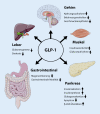[Obesity treatment: will pharmacotherapies replace metabolic surgery in the future?]
- PMID: 37286802
- PMCID: PMC10246874
- DOI: 10.1007/s00108-023-01530-0
[Obesity treatment: will pharmacotherapies replace metabolic surgery in the future?]
Abstract
Obesity is a chronically progressing disease that represents a major challenge for affected patients, health care professionals and society, since it is highly prevalent and associated with several comorbidities. The treatment of obesity aims at body weight reduction, reducing the burden of comorbidities and weight maintenance after weight loss. To achieve these goals, a conservative treatment strategy is recommended that consists of an energy-reduced diet, increased physical activity and behavioral modifications. If individual treatment targets cannot be achieved by basic treatment, stepwise therapy intensification should be initiated including short-term very low calorie diets, pharmacotherapy or bariatric surgery. However, these treatment approaches differ with respect to average weight loss and other outcomes. There is still a large gap between the efficacy of conservative strategies and "metabolic" surgery that cannot be filled by current pharmacotherapies. However, recent advances in the development of anti-obesity medications could change the positioning of pharmacotherapies in obesity management. Here we discuss whether next-generation pharmacotherapies have the potential to become an alternative to obesity surgery in the future.
Adipositas ist eine chronische, fortschreitende Erkrankung, die aufgrund ihrer hohen Prävalenz und zahlreichen Folge- und Begleiterkrankungen eine enorme Herausforderung für Betroffene, Behandler und Gesundheitssysteme darstellt. Die Adipositastherapie verfolgt als wesentliche Therapieziele eine Gewichtsreduktion, die Verbesserung von Begleiterkrankungen und die Stabilisierung des reduzierten Gewichts. Um diese Ziele zu erreichen, wird zunächst eine konservative Basistherapie empfohlen, deren Grundlage energiereduzierte Mischkost, Erhöhung der körperlichen Aktivität und Verhaltensmodifikation sind. Wenn mit diesen Maßnahmen individuelle Therapieziele nicht erreicht werden, erfolgt eine stufenweise eskalierende Therapie, die kurzzeitige niedrigkalorische Kostformen, Pharmakotherapien und die Adipositaschirurgie einschließt. Diese Therapieformen unterscheiden sich erheblich in Bezug auf die zu erwartende mittlere Gewichtsreduktion. Zwischen der konservativen Basistherapie und der sogenannten metabolischen Chirurgie besteht eine große Lücke im gewichtsreduzierenden Potenzial, die bisher durch Medikamente nicht geschlossen werden konnte. Dies könnte sich durch die nächste Generation von Medikamenten zur Adipositastherapie ändern. In diesem Beitrag wird diskutiert, ob durch die aktuellen Entwicklungen die Pharmakotherapie eine Alternative zur bariatrischen Chirurgie werden kann.
Keywords: Dual incretin agonists; Glucagon-like peptide‑1 receptor agonists; Semaglutide; Tirzepatide; Weight reduction.
© 2023. The Author(s), under exclusive licence to Springer Medizin Verlag GmbH, ein Teil von Springer Nature.
References
-
- Del Prato S, Kahn SE, Pavo I, Weerakkody GJ, Yang Z, Doupis J, et al. Tirzepatide versus insulin glargine in type 2 diabetes and increased cardiovascular risk (SURPASS-4): a randomised, open-label, parallel-group, multicentre, phase 3 trial. Lancet. 2021;398:1811–1824. doi: 10.1016/S0140-6736(21)02188-7. - DOI - PubMed
-
- Ludvik B, Giorgino F, Jodar E, Frias JP, Fernandez Lando L, Brown K, et al. Once-weekly tirzepatide versus once-daily insulin degludec as add-on to metformin with or without SGLT2 inhibitors in patients with type 2 diabetes (SURPASS-3): a randomised, open-label, parallel-group, phase 3 trial. Lancet. 2021;398:583–598. doi: 10.1016/S0140-6736(21)01443-4. - DOI - PubMed
-
- Rosenstock J, Wysham C, Frias JP, Kaneko S, Lee CJ, Fernandez Lando L, et al. Efficacy and safety of a novel dual GIP and GLP-1 receptor agonist tirzepatide in patients with type 2 diabetes (SURPASS-1): a double-blind, randomised, phase 3 trial. Lancet. 2021;398:143–155. doi: 10.1016/S0140-6736(21)01324-6. - DOI - PubMed
Publication types
MeSH terms
Substances
LinkOut - more resources
Full Text Sources
Medical
Miscellaneous


